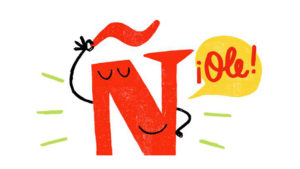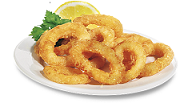Blog
Con ñ de España
 One of the singularities of the Spanish language is the use of the letter ñ. From the first moment we find this particularity in the name España o español. Where does this letter of exclusive use in the Spanish language come from?
One of the singularities of the Spanish language is the use of the letter ñ. From the first moment we find this particularity in the name España o español. Where does this letter of exclusive use in the Spanish language come from?
If we research the net, we can find its origin and specific sound (similar to -ny-for English speakers), according to Wikipedia:
“Historically, ñ arose as a ligature of nn; the tilde was shorthand for the second n, written over the first. This is a letter in the Spanish alphabet that is used for many words, for example, the Spanish word año (anno in Old Spanish) meaning “year” and derived from Latin ANNVS.
Already in medieval Latin palaeography, the sign that in Spanish came to be called virgulilla (meaning “little comma”) was used over a vowel to indicate a following nasal consonant (n or m) that had been omitted, as in tãtus for tantus or quã for quam. This usage was passed on to other languages using the Latin alphabet although it was subsequently dropped by most. Spanish retained it, however, in some specific cases, particularly to indicate the palatal nasal, the sound that is now spelt as ñ.
From spellings of anno abbreviated as ãno, as explained above, the tilde was thenceforth transferred to the n and kept as a useful expedient to indicate the new palatal nasal sound that Spanish had developed in that o. The sign was also adopted for the same palatal nasal in all other cases, even when it did not derive from an original nn, as in leña (from Latin ligna) or señor (from Latin senior).
The palatal nasal sound is roughly reminiscent of the English consonant cluster /nj/ canyon /ˈkænjən/. While this common description is enough to give a rough idea of the sound, it is not precise.
Although ñ is used by other languages whose spellings were influenced by Spanish, it has recently been chosen to represent the identity of the Spanish language.”
Finally and to summarize, we must always emphasize on the correct pronunciation of this letter, which represents a sound very different from the sound of the letter n and of course highlight the importance of writing the words that contain this sound correctly, with the small comma on top of the ñ.
Here are some of the most common words with ñ:
Año year
Niño little boy
Araña spider
Baño bathroom
Extraño strange
Mañana morning
Señor Sir
Montaña mountain
Sueño dream
Compañía company
Otoño autumn
And many more!
TAPAS
 I would like to open this blog with an entry about something specifically Spanish, so I am going to talk about the well-known tapas.
I would like to open this blog with an entry about something specifically Spanish, so I am going to talk about the well-known tapas.
Tapas is one of the greatest pleasures that can be found in Spanish culture, it is not only about eating out but about a whole social experience.
A tapa is an aperitif that is served in most bars with alcoholic or non-alcoholic drinks, they have become an identity sign of Spain and Spanish culture. There are several expressions that refer to the action of eating tapas: tapear, ir de tapas o el tapeo amongst others.
There are several explanations about the origin of the word tapa. Some believe they were due to economic interest of bartenders who served small pieces of salty food, such as ham to make the clients drink more. Others think they appeared as a result of covering the drinks with a piece of bread or ham as a made-up lid to stop the flies and dust getting inside the drink.
It is possible to eat out and have a meal exclusively based on tapas. The size and quality of the tapas depend on the region and the bars, it is best to ask the locals where to try the best tapas in the area, it is a great way to get to know a city while enjoying fantastic Spanish food.
Most of the tapas are served cold, only some of them are served hot such as croquettes, squid, Spanish omelette, stuffed peppers, etc. To eat tapas, you are not only limited to Spanish taverns or bars, they have also achieved a place in more formal menus and environments, they have become very popular in high quality restaurants where they are served as starters or aperitifs.
Here there is a list of most famous tapas (yum!):
¡Qué aproveche!
- « Previous
- 1
- 2










